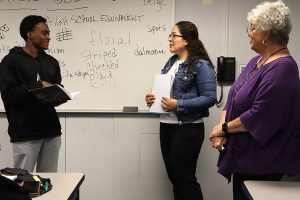Sociology focusses on how individuals relate to a society as a whole, and what influences individuals and societies have upon each other. Sociology classes prepare individuals for fields that involves investigative skills and working with diverse populations including Business, Public Administration, Politics and Journalism.
Faculty are available during scheduled office hours to advise students about their courses and program. Peruse some of the offerings in the Department of Social and Behavioral Sciences.
This is only a suggested transfer program and might not be appropriate for every student. Some four-year institutions accept more than 62 credits in transfer to fulfill requirements in sociology. Consult the College & Career Success Center for help in selecting courses appropriate for the program at the college or university where you plan to transfer.
Mission
The mission of the sociology department is to teach how societies are constructed, how they change and how societies come into conflict. Sociology also studies how individuals relate to a society as a whole, and what influences individuals and societies have upon each other. Sociology courses examine social issues in the United States, such as diversity, social inequality, poverty and crime, the educational system, gender roles, and the workplace. Sociology also analyzes and compares these problems to social problems in other contemporary societies and historical periods.
Student Learning Outcomes (SLOs):
Students taking Sociology classes will be able to:
- Define the sociological perspective and its development in explaining human behavior.
- Explain and compare the major theoretical orientations in sociology and applying them. In order to assess, understand and determine ways to improve social patterns, through independent and/or collaborative problem-solving assignments and class debates.
- Describe the methods (quantitative) and the technology used in sociological research, and its application, and be able to apply the steps in the scientific research process through either the design and/or implementation of a sociological study.
- Analyze the nature and significance of social structures and social institutions.
- Explain the nature and significance of culture, subcultures, social norms, ethnocentrism and cultural relativism through collaborative learning experiences.
- Describe the process of socialization and the influence of agents of socialization on the development of an individual’s personality.
- Explain and compare the sociological perspectives on deviance and crime.
- Assess the nature and significance of social stratification, focusing on such variables as social class, race, age, and gender.
- Evaluate the importance of the workplace as a central sociological experience, its influence on personalities and its importance in the culture of this class.
Overview for College Success
Overview for College Success (OCS 121) is a course designed to assist students in the navigation of becoming successful in college and life. Major topics include setting academic, career and personal goals; effective communication strategies; study skills; critical thinking; self-discovery; and learning styles. In addition, this course delves into topics such as stress management, diversity and other well-being topics. Students will develop educational and career plans, learn to utilize college resources and receive extensive help in course planning. OCS 121 credit is not calculated in the course minimum credit totals listed in this section.
Students must take OCS 121 if they meet one or more of the following:
- First time degree seeking students.
- Transfer student with less than 12 credit hours and no evidence of similar course on transcript.
- Registering for 6 or more credits.
- Test into 2 or more developmental classes.
- Currently does not have OCS credit or registered for OCS.
Recommended AA Transfer Curriculum for Sociology
For those wanting to study society and social behavior by examining the groups and social institutions people form, as well as various social, religious, and political organizations. Sociology classes prepare individuals for fields that involve investigative skills and working with diverse populations, including business, public administration, politics and journalism. Sociology can be a basis for positions in social service and government areas.
This is only a suggested transfer program and might not be appropriate for every student. Some four-year institutions accept more than 62 credit hours in transfer to fulfill requirements in sociology/anthropology. Consult the Transfer Center for help in selecting courses appropriate for the program at the college or university where you plan to transfer.
Minimum General Education (42)
| Overview for College Success | CREDITS | |
|---|---|---|
| OCS 121 | Overview for College Success | 1 |
| Communications (9) | ||
|---|---|---|
| ENG 101 | Composition and Rhetoric | 3 |
| ENG 102 | Composition and Research | 3 |
| SPE 108 | Oral Communication | 3 |
| Humanities and Fine Arts (9) | ||
| PHL 101 | Introduction to Philosophy | 3 |
| GROUP II | Select from Humanities Electives Students earning an Associate degree must meet the requirement for coursework on improving human relations as defined in Public Act 87-581. |
9 |
| Social and Behavioral Science (9) | ||
| ANT 101 | Anthropology | 3 |
| PSY 101 | Introduction to Psychology | 3 |
| PSY 204 | Social Psychology | 3 |
| Mathematics (3) | ||
| MTH 115
MTH 126 |
General Education Mathematics OR Fundamentals of Statistics |
3
3 |
| GROUP IV | Select from Mathematics Electives | 3 |
| Physical and Life Science (7-8) | ||
| GROUP V | Select from Physical and Life Sciences Electives (Must include one lab) | 7-8 |
Area of Concentration/Electives (24-25)
Select from the following courses.
| SOC 101 | Introduction to Sociology | 3 |
| SOC 102 | Social Problems | 3 |
| SOC 205 | Marriage and the Family | 3 |
| SOC 206 | Juvenile Delinquency | 3 |
| SOC 225 | Racial and Ethnic Relations | 3 |
| Minimum for AS Degree | 62 | |
|---|---|---|




